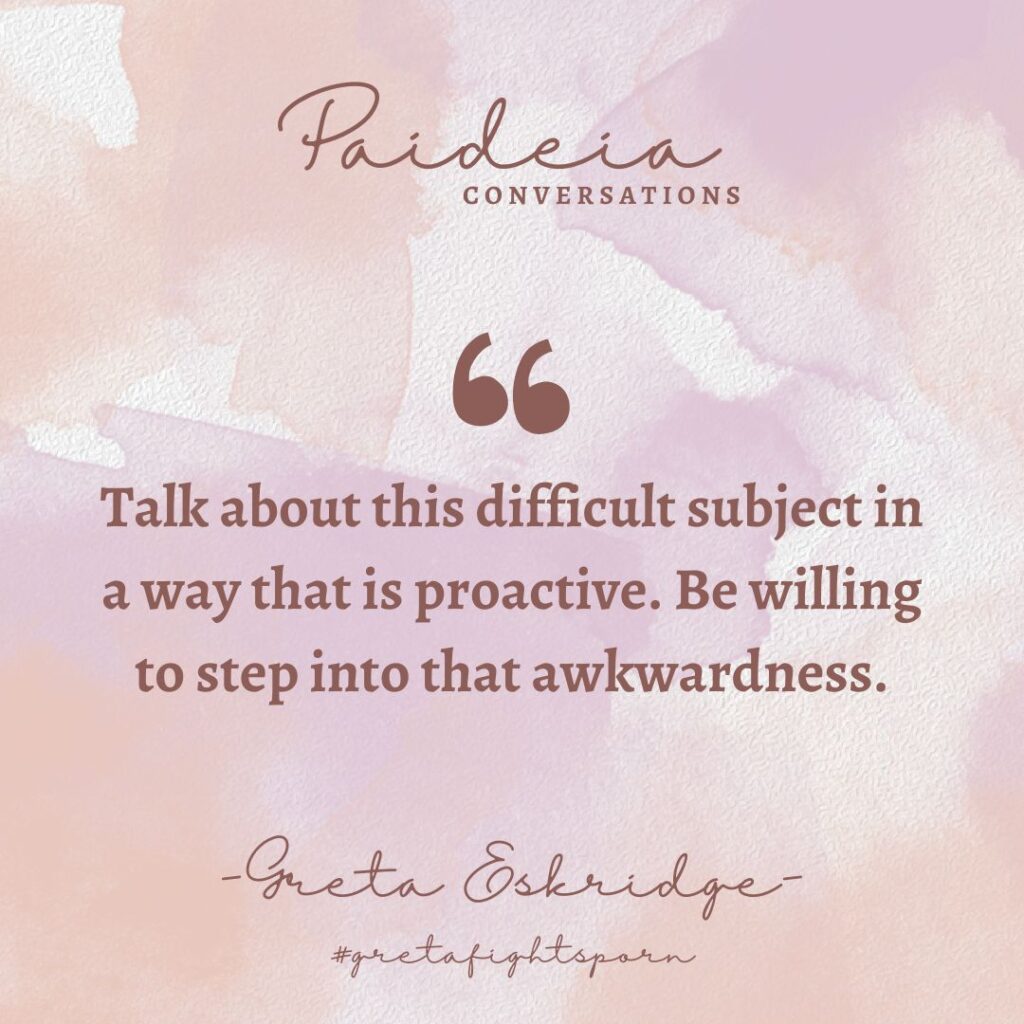Paideia Conversations, Ep. 13
Join Melissa Cummings today in this nuanced conversation with Greta Eskridge about her passion for cultivating true connection with her children through adventure, and combatting the destruction of connection through the atrocity of pornography. This is a real life conversation between two real moms, and we hope you will find encouragement here to have big conversations with your kids. We also share lots of ideas for further reading if you need recommendations on this topic!
Resources and Links:
Adventuring Together by Greta Eskridge
100 Days of Adventure by Greta Eskridge
Good Pictures, Bad Pictures by Kristen A. Jenson
Good Pictures, Bad Pictures, Jr. by Kristen A. Jenson
Chasing Love by Sean McDowell
The Tech-Wise Family by Andy Crouch
Habits of the Household by Justin Whitmel Earley
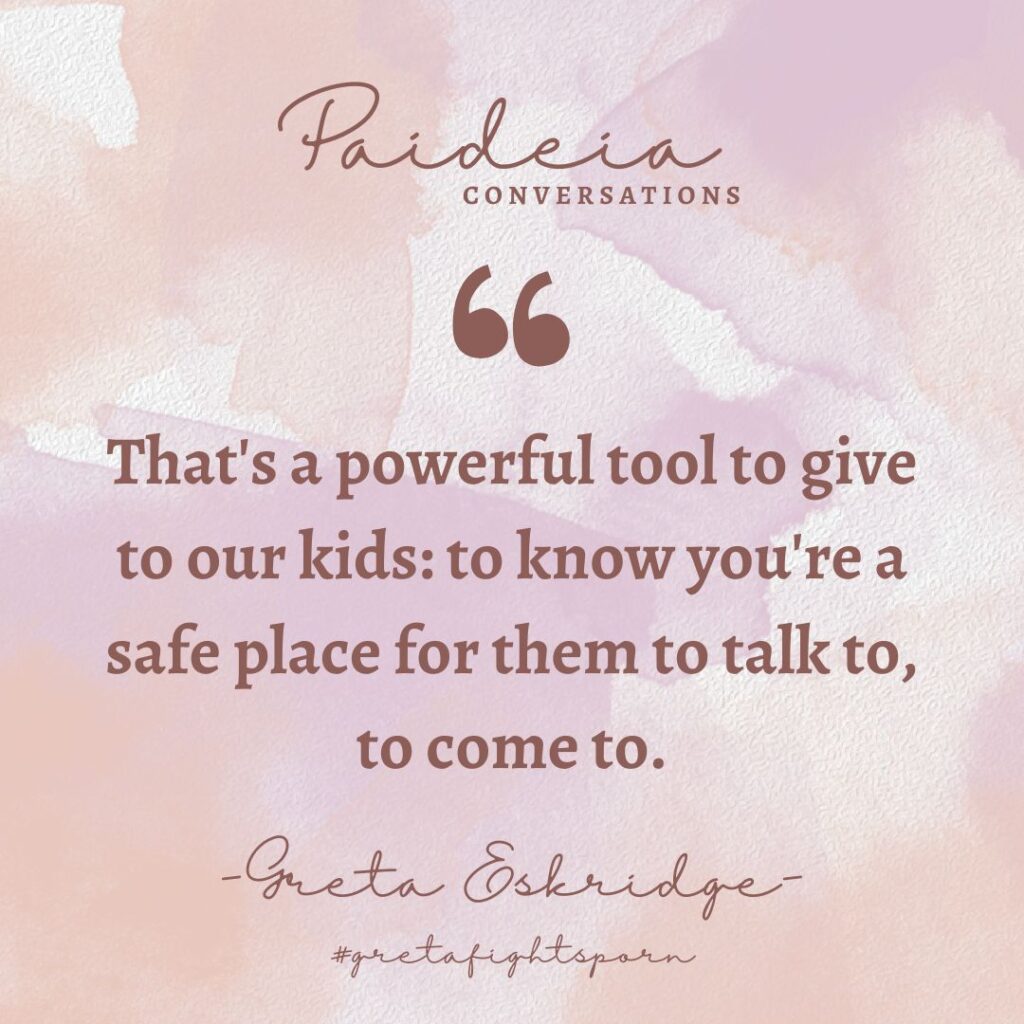
Additional Recommended Resources:
The Talk: 7 Lessons to Introduce Your Child to Biblical Sexuality by Luke Gilkerson
Mama Bear Apologetics Guide to Sexuality by Hillary Morgan Ferrer
Not If But When by John Perritt
TRANSCRIPT
Melissa: Hello and welcome to Paideia Conversations where we dialogue about all things paideia. I am your host, Melissa Cummings, from Paideia Northwest. This is where you can listen in as Christian mamas discuss our purpose to raise our children in the nurture, admonition, instruction, and discipline of the Lord — His paideia.
Joining me today is Greta Eskridge.
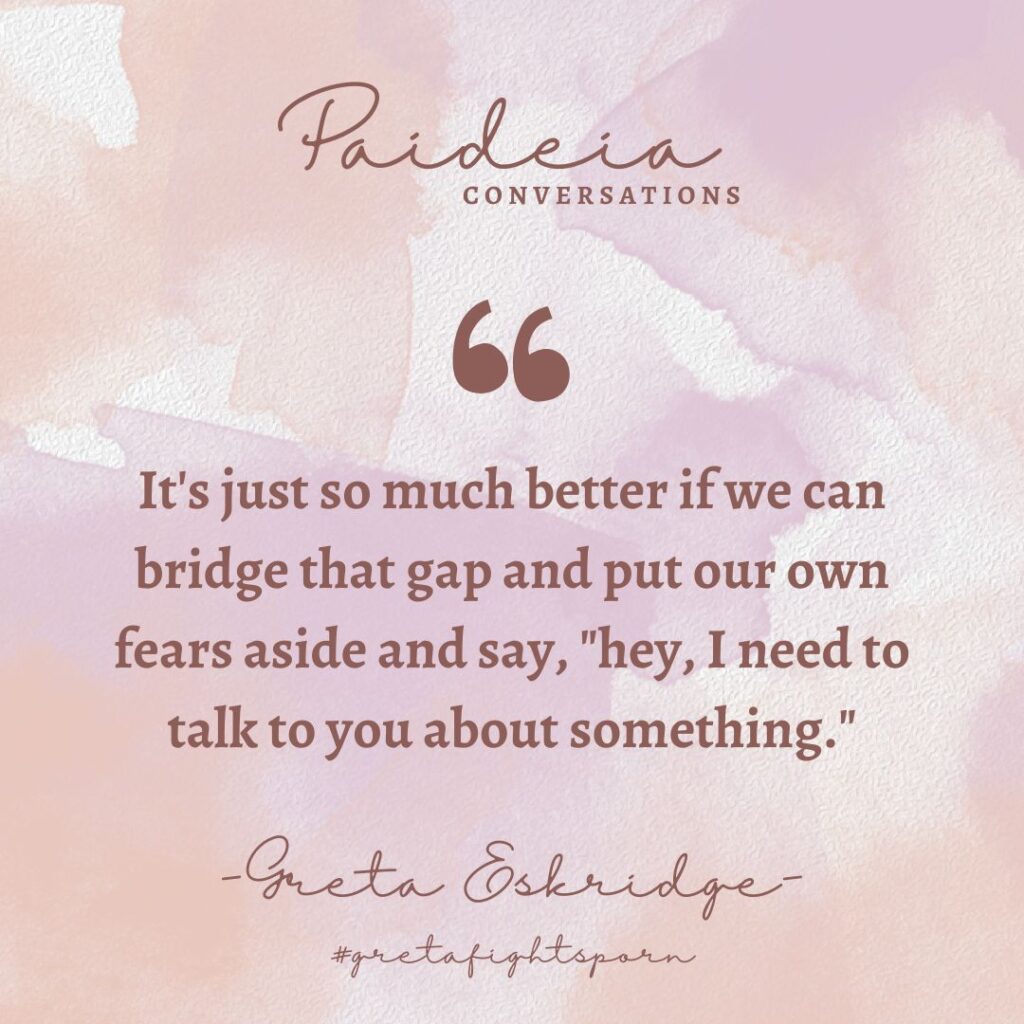
Melissa: Joining me today for this Paideia Conversation is Greta Eskridge. She is an author, a speaker, a blogger, and an adventurous homeschooling mama. And she is also the one behind the hashtag #gretafightsporn and that’s why I’ve asked her to join me today for this little conversation about a not to little topic. And we invite you into this conversation with us as we continue to practice, pursue, and implement paideia.
Madeleine l’Engle said, “Our responsibility to them is not to pretend that if we don’t look, evil will go away. But to give them weapons against it.”
Frederick Douglas said, “It is easier to build strong children than to repair broken men.”
I honestly wouldn’t necessarily say it is easy to build strong children either. So to think that this is hard, to think that these are difficult topics, to think that this takes some stamina and a lot of groundbreaking work is pretty key.
Now, the reason that I wanted to broach this conversation is because I don’t think it’s something that a lot of people have recognized is so important until recently.
I know it’s something my husband and I are interested in as we’re raising our five kids for the glory of God, and we have four sons — we’re also a very tech oriented family. We own a tech business, a Bible app software company, and we have at least one son who wants to go into computer programming. He already does that. He’s only fourteen but he’s been doing computer programming for a couple of years. And we are definitely in the “Delay is the way” camp, as far as it comes to technology. And we are a low budget screen time family. We do a family movie once a week. The kids do the Worldle, they each take turns doing that on a fairly regular basis. But that’s really it! We have a spare phone, an old phone, we send with our teenager when he goes to work so that he can text me and let me know when to come pick him up. But he will be the first one to tell you that he’s not having his own phone until he has his own vehicle and a job where he drives himself and he would need that kind of technology in his pocket on a regular basis. So this is something that is new to us as parents, but I think this is something that is common to all of us as parents in this digital age. I think protecting our kids from pornography is important, I think hedging the time that our children spend on screens is important, and I think that as Christian parents we need to be willing to be a bit radical, to be different, to stand out. And so these are the questions I have. I want to know, what does it mean to protect kids from pornography? What does it mean to cultivate a healthy sexual culture in our home? What does it mean to protect them digitally? What does wisdom look like for a family who is definitely pro-technology, but we want to -even more than that- be pro-wisdom?
I read Tech-Wise Family by Andy Crouch about a year ago, and it had a lot of great stuff in it. But I feel like it’s the kind of book that I need to go back to and review maybe once a year.
I also just read Habits of the Household by Justin Whitmel Earley, and it had a whole section on screens and tech. That was wonderful. I highly recommend that book! Not just for the idea of tech or screens or pornography but for cultivating habits that reflect the actual values – the actual Christian values and the theology behind it… how do we build strong children, and how do we give them weapons against evil? What tools are at our disposal to walk our children through this strange new world of having the world right inside of our homes and access to all of these things right in our pockets? How do we walk with wisdom alongside of our children? So these are the questions that urged me to bring Greta Eskridge into the conversation, and then also Chris McKenna from Protect Young Eyes who will be joining us later. Protect Young Eyes is also… it’s a great website, I would suggest looking at that. I would suggest their app, the Protect Young Eyes app. And I am hoping to bring some kind of webinar or workshop with Greta Eskridge and Chris McKenna to the Paideia Northwest community sometime soon. Schedules are hard to coordinate when you’re in three different states and a couple different time zones. And we’re all busy parents who just do these sorts of things on the side. But I think it’s worth prioritizing these types of conversations and these types of events.
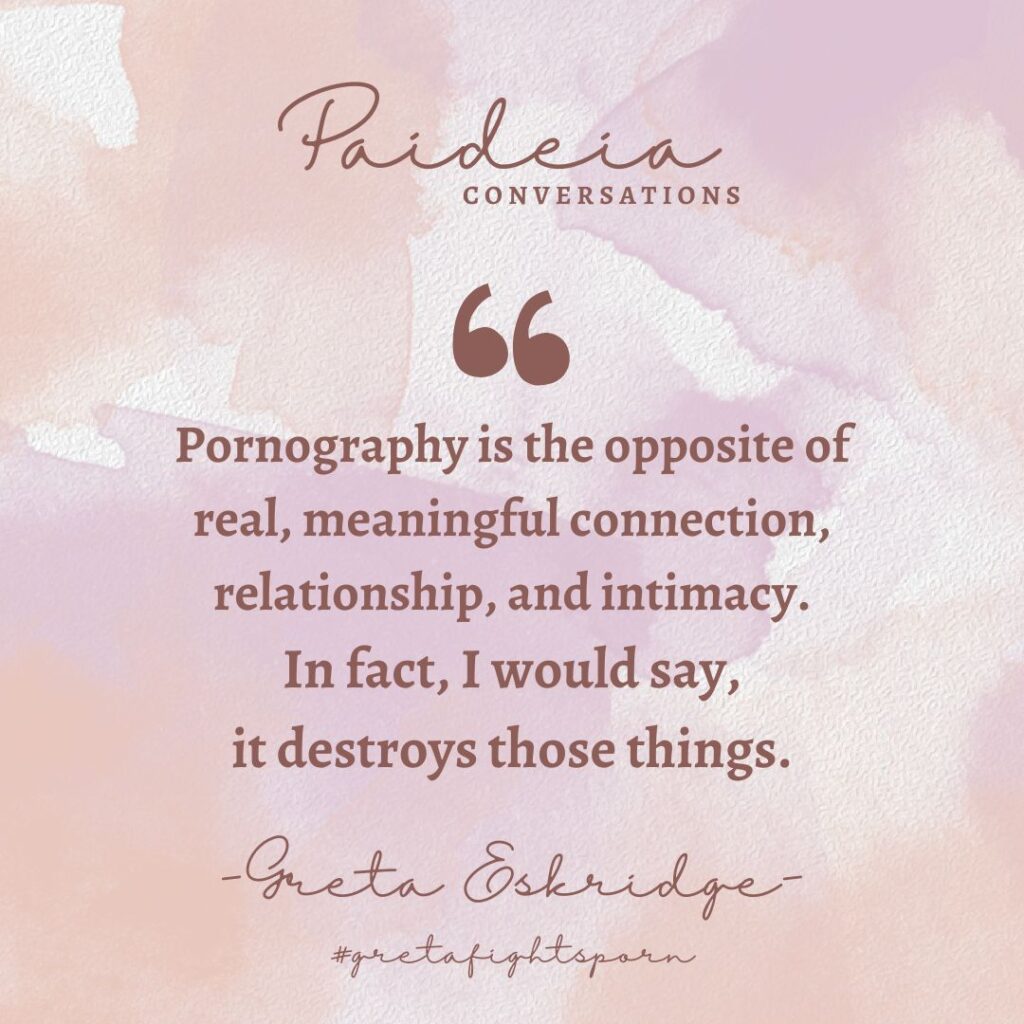
Melissa: so I’m super curious… because I first started following you on Instagram when… I don’t know, this was a few years ago… you would take me… you didn’t know you took me, but you would take me to the coast and you would go to the tide pools…
Greta: hmm, yes.
Melissa: and all that adventuring, right? So that’s how I fell in love with you and your kids. Because I grew up in the Santa Cruz kind of area, but now that I live in Northeastern Washington, you know, tidepools are a thing of the past. And so watching your videos was lifechanging for my kids. And so now we go to the Oregon coast once a year, and we go to tidepools. And I still think back to those days when I would show my kids, “look, look at these pictures! Ma And Pa Modern, they are up, let’s try to find some of these!” Anyhow. But then I started noticing this whole “Greta fights porn” thing, and I thought, well that’s not like tidepools.
Greta: like that’s weird! [laughter]
Melissa: yeah, like, what in the world? And I mean this was a few years ago. My oldest is fourteen, and so it’s kind of a, you know, it’s kind of a present conversation now. But at that point I didn’t ever think about it, I never thought that it should be a “now” kind of topic. And so following your GretaFightsPorn hashtag over time, I’ve kind of seen, it actually should be a “now” topic whenever “now” happens to be.
Greta: totally.
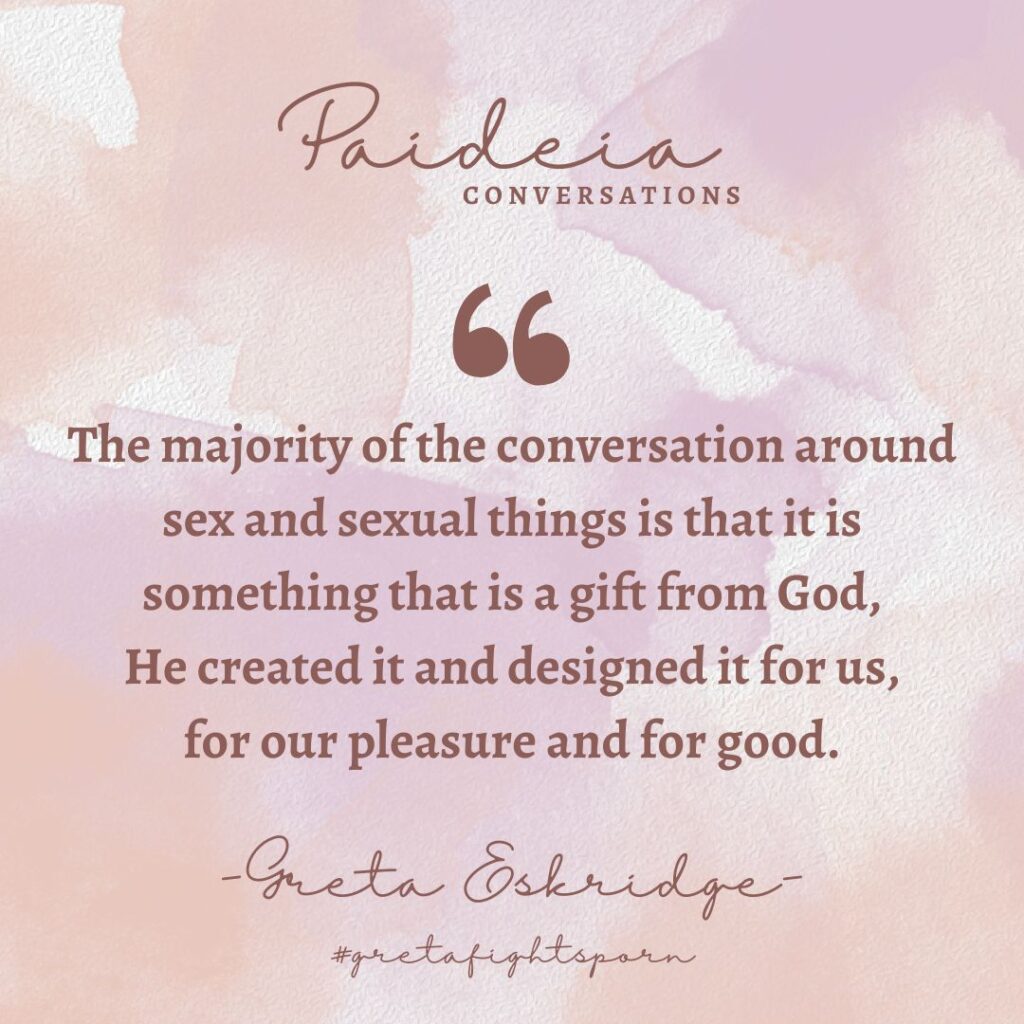
Melissa: I don’t remember if it’s…, I think maybe it’s Chris McKenna from Protect Young Eyes who says “10 Before 10.”
Greta: yeah.
Melissa: so ten conversations about… is it pornography? Do you know? Is that what he says for 10 Before 10, or is that just…?
Greta: yeah, um, and uh, pornography for sure, and you know what digital safety looks like. And that’s just so alarming to a lot of parents because they’re like, you know, you tell them that you need to talk to their kids who are under ten about pornography. And they freeze. Cuz they’re like, there’s no way I’m gonna talk to my eight year old about that. But the average age for the first exposure to pornography is eight years old. So if you haven’t talked to your kids yet, and they’re eight or nine or ten or twelve, and you’ve never talked to them about pornography, what it is, and what to do if they see it, then you are risking the chance that they are going to not know what to do, and just freeze. Or be terrified. Or be curious. And no one said, “don’t go back and look again.” It’s just so much better if we can bridge that gap and put our own fears aside and say, “hey, I need to talk to you about something even though you’re only eight.”
Melissa: right. Can you introduce, briefly, like yourself… your adventure books are what I love sharing the most right now. But then, I mean, you’re an author, you’re a speaker, you’re a blogger, you’ve got this hashtag, right.
Greta: a mystery. It’s very troubling, I don’t make any sense. I’ve had several publicists like reach out to me and they’re like, umm, you’re kind of all over the place, it’s hard to brand you. And I was like, I know, I don’t fit in a box!
Melissa: renaissance woman.
Greta: [laughter] Because all of those things are important to me! First of all, first and foremost I think what drives me is that I’m a mom, I have four kids and I’m passionate about cultivating relationship and connection with my kids. And I do that through chasing adventure with them and pursuing, you know, making meaningful lasting memories through these adventures we do together. And I love that part of our life! And it’s been a part of our life for, you know… my oldest is eighteen, we’ve been doing it regularly every single week since he was five. And I love it so much I wrote a book about it, Adventuring Together. My first book! How to create meaningful and last memories together with your kids. But the flip side of that is that I want to make sure that I’m talking to my kids about things that break that connection and break relationship. The antithesis of connection, and that is pornography. Pornography is, it is the opposite of real, meaningful connection, relationship, and intimacy. In fact, I would say that it destroys these things. And the reality is that our kids are growing up in a world where pornography is so easily accessible – accidentally, on purpose, it’s out there. And you know, raising my kids, they’re growing up, and I think, wow, I have to, I have to deal with this with them. Because I don’t want them to grow up and I never talked to them about it and just sort of left them to figure it out by themselves. Because I think that that is the opposite, like I said, of what I want to help them achieve, which is lasting, meaningful connection and relationships. First with me and my husband, with our family, and then as they grow up and have that with their own families. And so that sort of became another passion of mine, is fighting porn and educating parents on how to talk to their kids. So the umbrella really is connection. So cultivating connection through things like adventuring together, but also battling the thing that wants to destroy connection which is pornography.
Melissa: I love that.
Greta: so there you go.
Melissa: there you go, you have an umbrella!
Greta: I branded myself! [laughter] But it’s not an easy brand. Because, adventure oh that’s fun, we can get on board with that. Oh, fighting porn, that’s awkward; we don’t really want to talk about it. And that’s the problem is that nobody wants to talk about it. But we have to. Like yes, I know it’s uncomfortable. Yes, I know it’s awkward. Yes, I know we don’t want to face that reality with our kids. But we have to. Because we have to protect them. But also, we have to help them have a future of sexual health. And not, like I said, like not enter their future relationships, their marriage, with the baggage of having battled or faced pornography and not knowing what to do with it.
Melissa: so on your blog, which is just, I’m trying to remember… is it just GretaEskridge.com?
Greta: yep, just GretaEskridge.com, real simple. Unlike my Instagram which doesn’t make any sense.
Melissa: actually okay, that’s a good question! Where does MaAndPaModern come from?
Greta: okay we’re sidetracking. Yeah so my Instagram handle is MaAndPaModern, and that came about because when I first started Instagram, I didn’t even know what it was. I had just gotten my first smartphone, and my friend was on Instagram, she was like, oh you’ve got to do it, it’s so fun. So I thought initially I would use it to help promote my husband’s art. He’s an artist, and loves midcentury modern design, architecture, and art. And I thought, okay, well we’re like, it’ll be a little about our family and our home, all of our kids are artists, and like showing our design sense and also his work. So it’ll be Ma and Pa Modern. So kind of like a play on words. We’re old fashioned, Ma and Pa. But we’re actually modern, but it’s really midcentury modern from the fifties… it made perfect sense to me! And then after I was on there for a little while, I was like, I don’t want to promote Aaron’s art, I want to promote my writing and the things that I care about. So um I’ll share it, but that’s not the point, that’s not the point. And then everyone’s like, you can’t change it, you’re Ma and Pa Modern, that’s who you are. So it’s funny when people will say to me, like, so are you like a modern day Ma and Pa Ingalls, are you guys homesteaders? [laughter] We’re like, nope! I do make sourdough bread, but that’s about the extend of my homesteading capabilities.
Melissa: Sunday morning bagels, right?
Greta: yep, that’s about it. Yep, Ma and Pa Modern or GretaEskridge.com that’s how you can find me.
Melissa: so on your blog, on your website, I remember reading about cultivating a healthy sexual culture in your home, and of course that’s an enormous topic, which is probably why you go and you speak on these things. So that’ll be something that I’m hoping in the future to pull from you, but just in sort of a brief introductory way… if that can even be concise, what does it mean to cultivate a healthy sexual culture?
Greta: well I think the reason it’s important to me to have that conversation as well as the one about pornography is that I never want to present to my own kids or to encourage parents to only say, hey there’s this awful thing called pornography, it’s bad, stay away from it – and then that’s the only conversation we have about sex. In fact, I want that to be just one small part of the conversation and the majority of the conversation around sex and sexual things is that it is something that is a gift from God. He created it and designed it for us, for our pleasure, and for good. And we’re made in His image, so our bodies are beautiful, they’re created and designed by Him. They’re not something for us to be ashamed of. He designed them to work together and to, again like I said, for our pleasure, to create human life. Those are all good things. So that’s the picture of sex and sexuality I want to give to my kids. And that’s a positive one. Because if we only focus on, pornography is bad – which it is – but that’s all that we talk about when it comes to sex, then we’ve left out all the good. And I don’t want to do that. And so I think if I work hard at creating this healthy sexual culture in my home, when the hope and the goal is that when or if… I think when… my kids encounter pornography or some sort of negative picture of sexuality or sex, that they will be able to come to me and say hey, I saw this, I have questions, I’m concerned, or this happened and I wish it hadn’t, I wish I hadn’t seen it, or I wish this experience hadn’t happened. But they’ll be able to come to me because we’ve cultivated a culture where we’re open, we’re not afraid to talk about these things and we’re not afraid to have questions or to say, what about this? Like, that’s the culture that I want to have in my family with my kids, and that’s what I want to have, help other parents achieve as well.
Melissa: sounds like open communication… before, during, after, all of those.
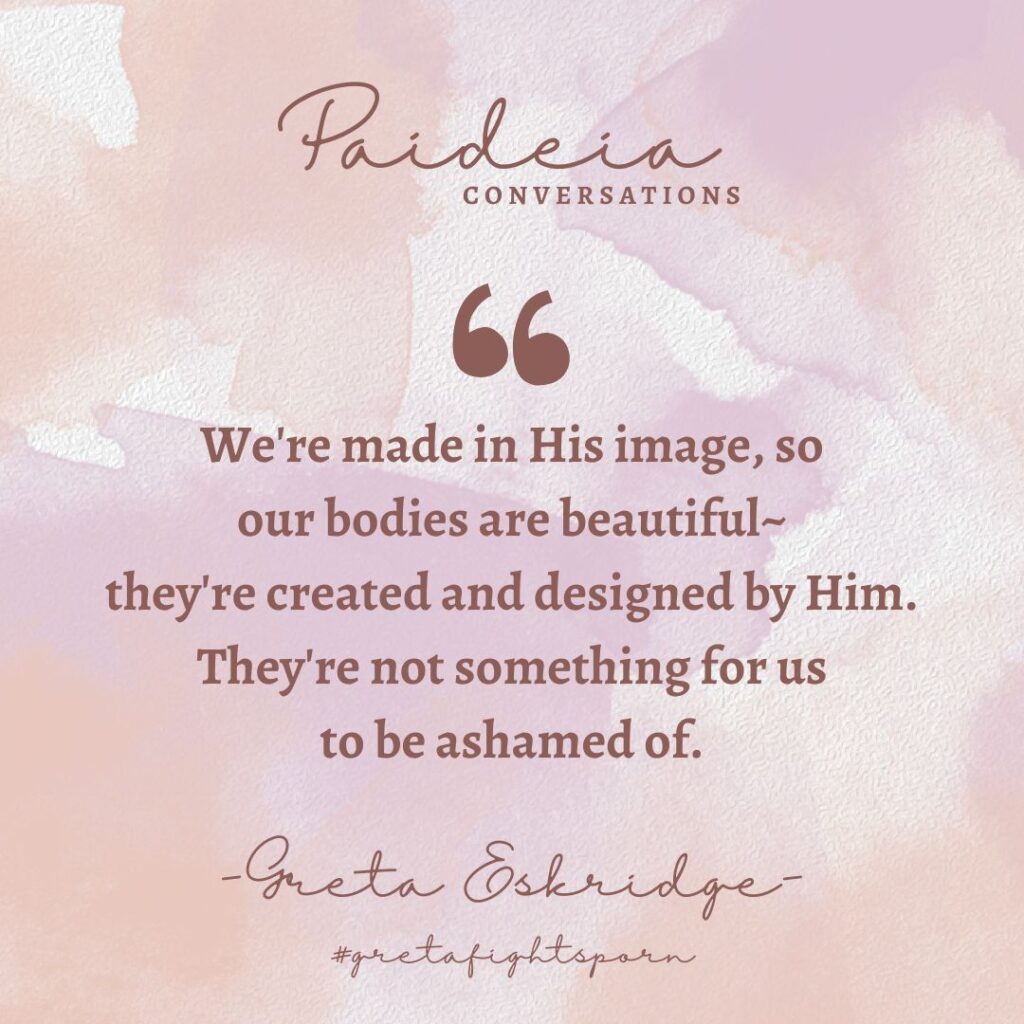
Greta: yeah. So it’s not about fear. It’s not about, it’s all bad. It’s about, yeah, that’s a distortion of the good thing God created. And so we want to reject that, and we want to move towards the beauty and the goodness God made.
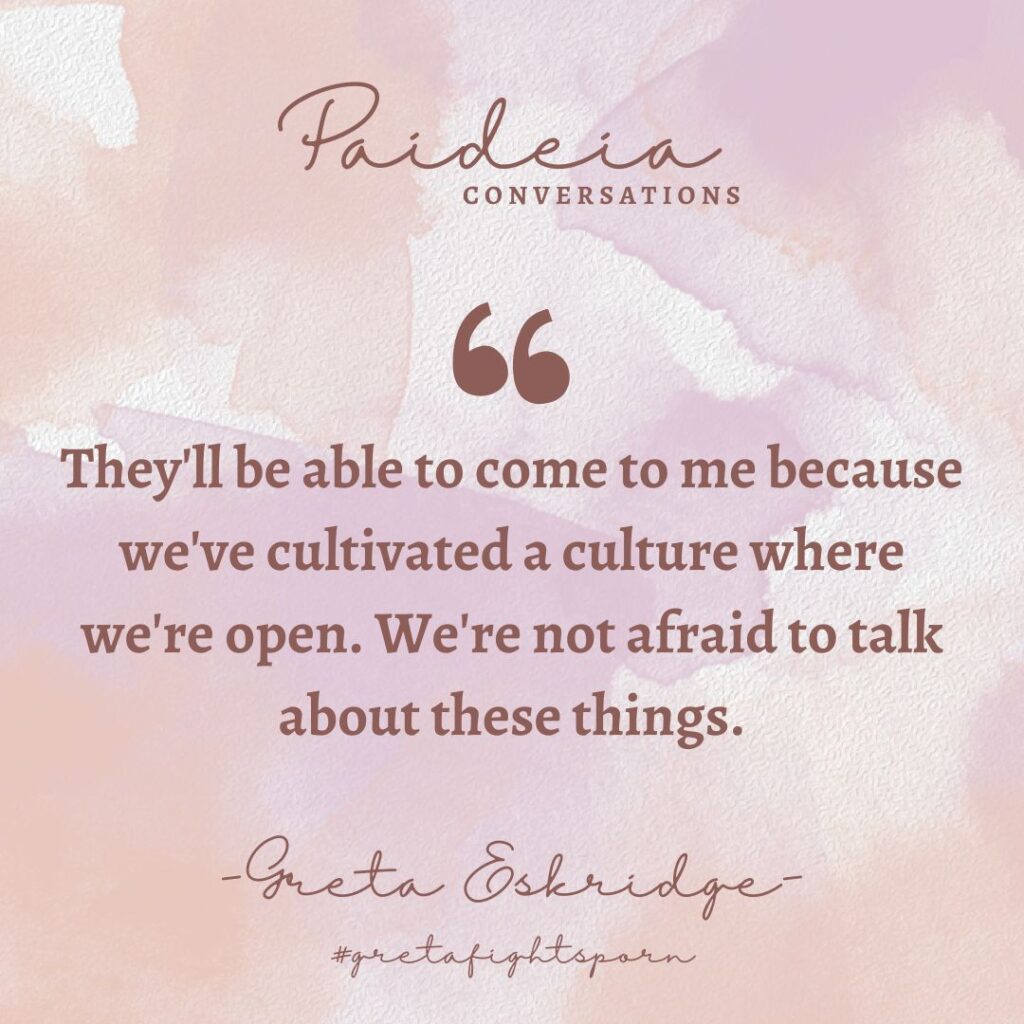
Melissa: what tools do you have to recommend for protecting, you know? Conversation obviously is the big one. Are there other things?
Greta: yeah. I think that a lot of times parents want to first and sometimes only, they’re like, tell me what I can just put on the phone, put on the tablet, put on the computer, and my kids will be safe. And I think that those things are incredibly important. You do need to install software, and put on things on those screens and devices to protect your kids. You need to have limits set in place for them. But that can’t be all that you do. And so I always say, like you said, it has to start with conversation. That should be when you have a six year old or a seven year old, and you are letting them know the limits. Like you, you know, you can’t just get online and look at YouTube all by yourself, that’s not a safe place to be. And so they shouldn’t have a device where they could do that, but they also need to know that’s not something they can do. So you have those limits in place. Limits that you’ve put in place, limits that they know. But then you also need to explain to them why they can’t just go on YouTube. And then if they were to do that… on purpose or accidentally… because they could be at someone’s house and they’re looking at YouTube or doing a Google search for you know Princess Jasmine, or whatever it is, Pokemon, I mean you could search anything and you could accidentally stumble upon inappropriate content. They need to know what to do. And so that’s when you, that’s really the basis. And you have a conversation and you say, hey there’s this thing called pornography. It’s bad for your brain, it’s bad for your heart, and it’s not safe. And it’s my job to keep you safe from it. And so here’s what you do if you see it. You just tell them, I think, keep it as simple as possible if they’re young.
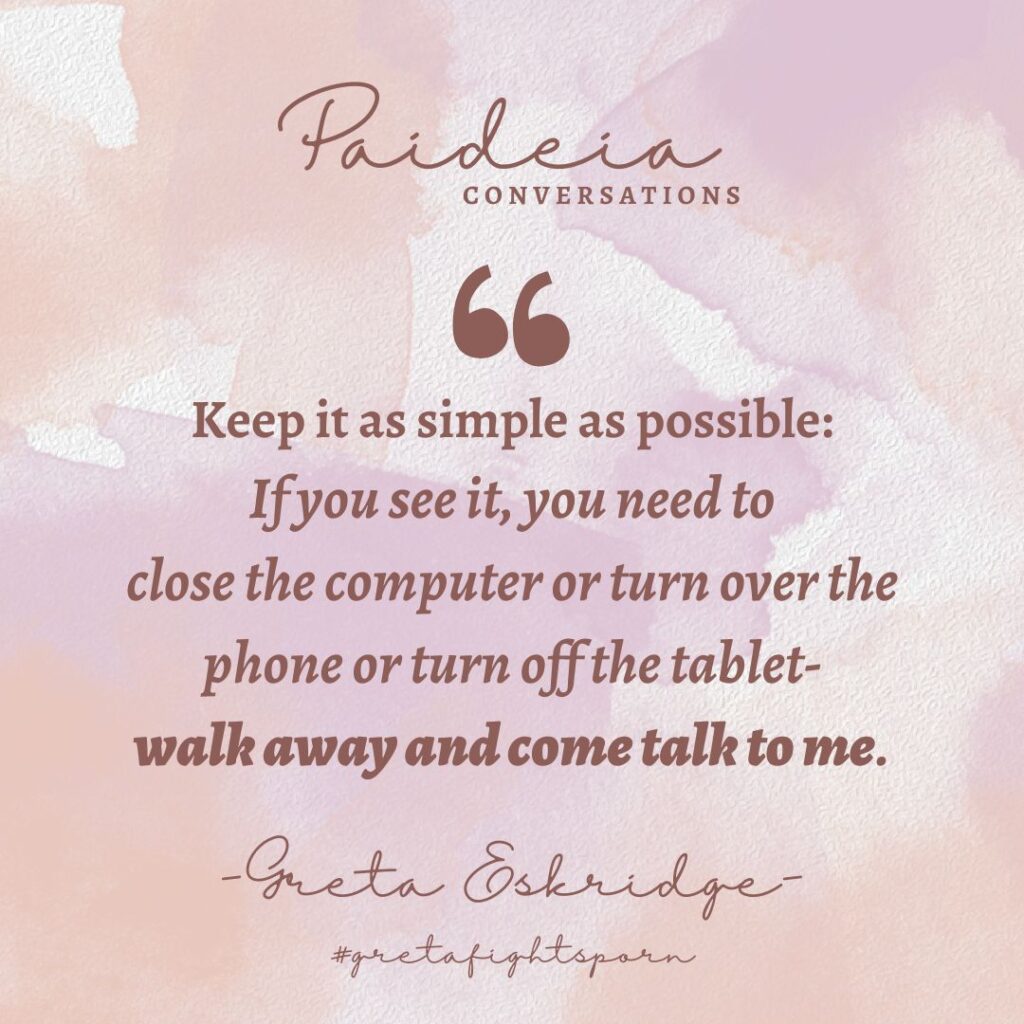
Greta: if you see it, you need to close the computer or turn over the phone or turn off the tablet, walk away, and come talk to me. So just real simple steps. And um if you feel like you can’t have that conversation on your own – because some parents they feel like, oh I wouldn’t know what to say, I’d get so flustered – there are books, for example there’s a book called Good Pictures Bad Pictures. That’s a great book to read with young kids. Read it first. You’re the parent. Read it first, decide what parts of it you want to share with your kids. Cuz you might not be ready to share all of it, or there might be some things that you want to change the language on. And then read that with your kids if you can’t have the conversation on your own. And then as your kids get older, this is really critical: you can’t like stop having the conversation. You can’t think, oh I did it when they were little. They know what it is, we’re all done now, I put some parental controls on their phone, and we’re fine, we’re all done now. You need to keep talking about it. And you actually need to broaden the conversation. So you need to start talking about things that they might encounter as middle schoolers or high schoolers. Things like how do you respond if someone were to ask you for a nude photo, or to send you one. What do you do? So many parents don’t even think that’s a conversation they should be having with their middle schoolers, but it is.
Melissa: especially as homeschool moms. “My kids are with me practically all the time,” right? Church, co op, music lessons – that’s kind of all they do outside of our four walls. And yet that does not mean that my homeschooled, conservative family, country kids are not going to be faced with those kinds of questions. Because those kinds of things can happen at youth Bible study!
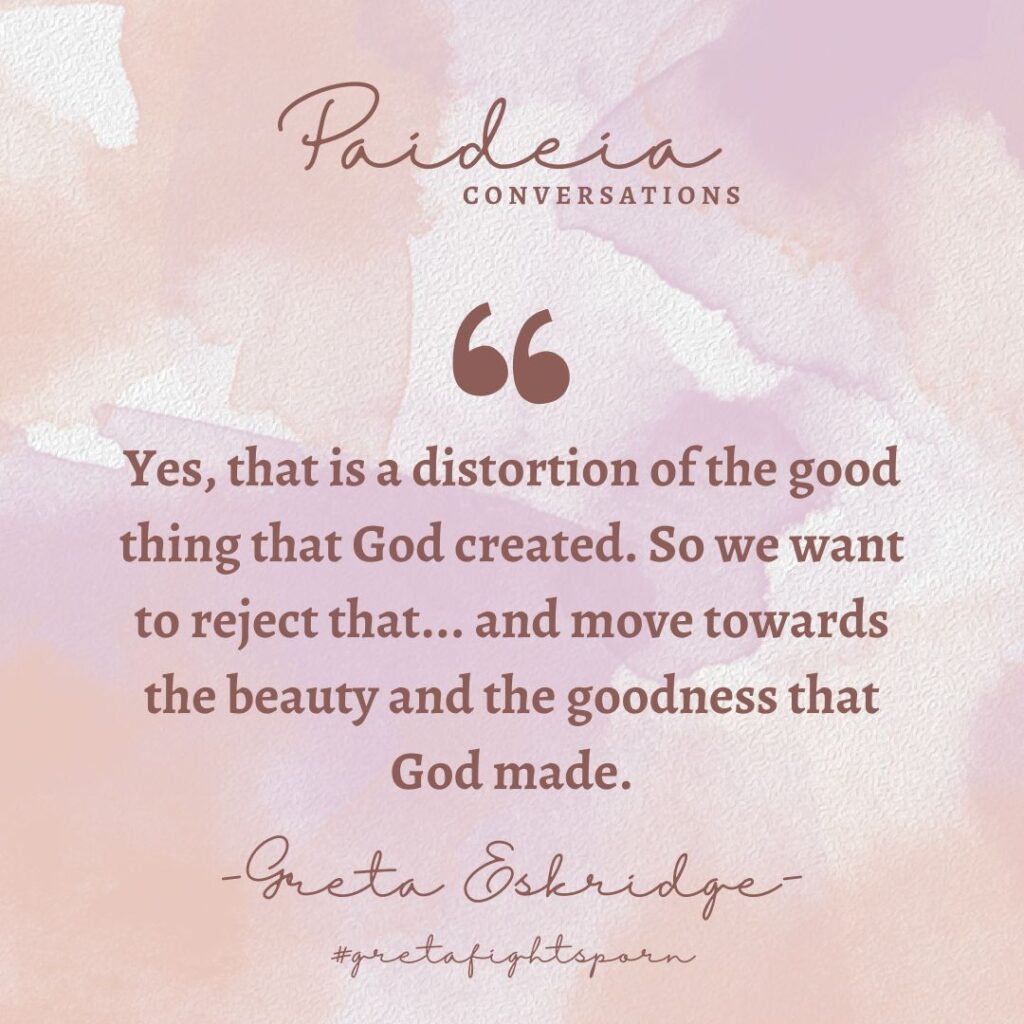
Greta: right, one hundred percent, yeah. And even if it didn’t happen while they were living at home with you, it could happen to them after they leave. And if you haven’t prepared them for it, then they’re not gonna know what to do then. So I think, I always think, that’s wonderful if they’re not exposed to any of this stuff before they’re eighteen and they move out. But have you trained them for what to do when they’re nineteen and they are moved out, or they’re twenty? Like you still have a job to do to prepare them for later, because it is going to happen at some point. I mean, I didn’t see pornography until I was an adult, and it was shocking to me as an adult. And so I want my kids to know how to handle it whether they’re a child or an adult. We need to give them the tools. So you have to keep talking to your kids. There are books for them to read when they’re older, for you to read with your kids. I think it’s so valuable to have those conversations with your teens. Like I have three teenagers now, and last year we read a book together called Chasing Love by Sean McDonald, and um, it is… I’m, not McDonald, McDowell. Sorry, Sean. I thought that doesn’t sound right. Sean McDowell’s book Chasing Love. And it’s, it’s all about sex, love, and relationships in our modern culture. I read it with all three of my older kids, I read it aloud. And we had… it was awkward sometimes, but we had great conversations. And things that they hadn’t thought about, things I hadn’t thought to talk to them about. And things that they needed to figure out like as they’re getting older, where do they stand on certain issues. And I just think that’s, that’s a powerful tool to give to our kids, to know you’re a safe place for them to talk to, to come to. And that you care so much about them you want to have these conversations with them to help them as they navigate a world that really is very different than it was when I was growing up. They’re entering a world that is tough, and we need to help them, we need to prepare them.
Melissa: yeah, that’s something that I read on your blog as well. It’s sort of this three part: pray for them, protect them, prepare them. And I loved that. I mean, I kind of like alliterations to begin with. Just pray, protect, prepare, and remembering that those are all kind of intertwined. I really liked that. I wonder if the, the idea of giving them something better… I know you’ve used that phrase before. What does it mean to give them something better? To give them a replacement, an alternate?
Greta: thank you, I love that you brought that up because it kind of connects to this idea of adventuring with my kids. I think that we are, again, so tempted to just say, that’s bad, don’t do it. But then we don’t say, here’s all of the good things you can do instead. And so, you know, we are like put all these limits on tech, don’t have screen time, don’t play video games, whatever your family like rules are in those regards. But are you offering wonderful alternatives to your kids? Are you, for example, teaching them how to cultivate real friendship and relationship and intimacy, showing them what those things look like? So that they, if they see pornography they’ll be able to identify that as a lie, it’s false, it’s not what real relationship and connection looks like.
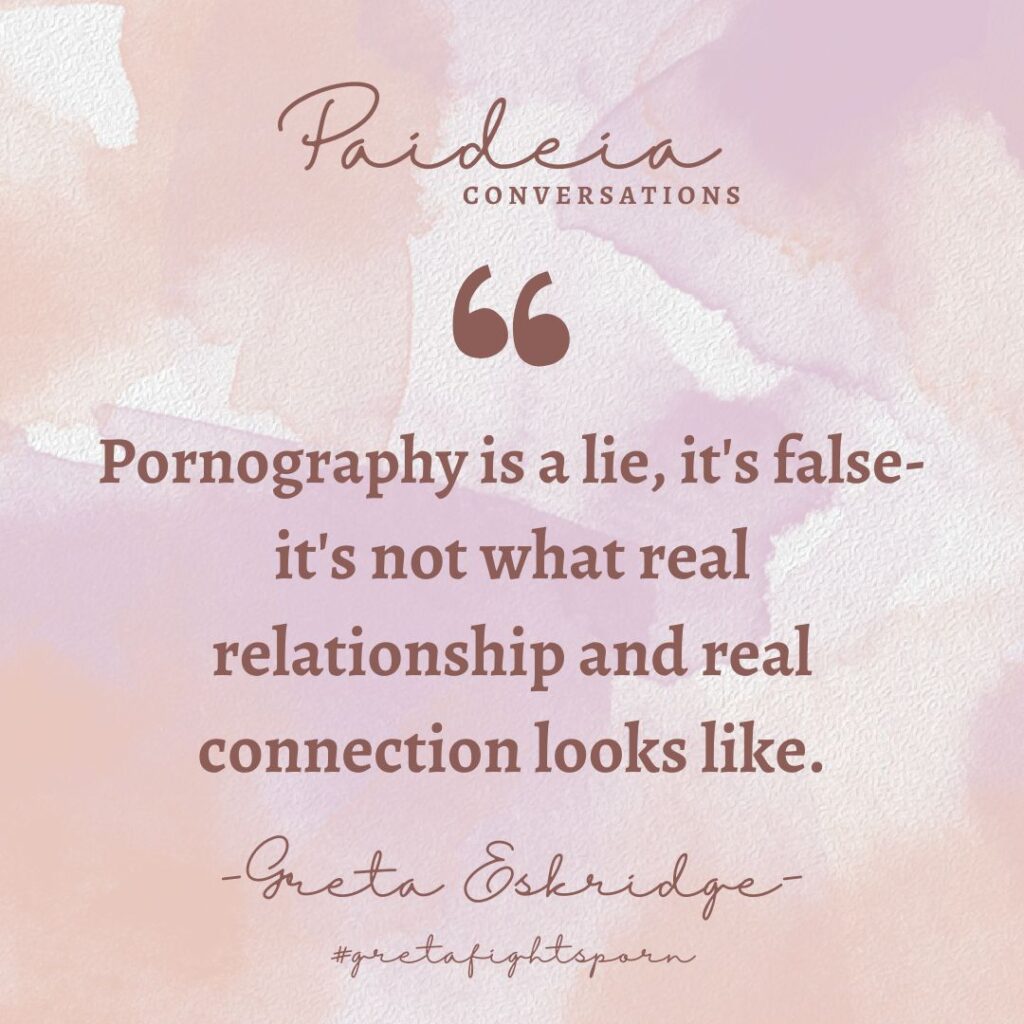
Greta: and so I think offering them good alternatives is your teaching them and showing them, sharing with them all the good things they can do instead. Because the reality is that a lot of people who turn to pornography or return to pornography, are doing it, especially I think in teen years, because they’re bored, they’re lonely, they’re discouraged, they’re depressed, they’re um frustrated, angry. They’re dealing with negative emotions, and pornography gives a quick dopamine hit that makes you feel better. And if we don’t recognize, and if we’re not honest, about the fact that pornography does make you feel better for a little bit, we’re missing out on one of its most powerful pulls. And we have to offer our kids something better. So that when they’re dealing with those negative emotions, they can say, oh there are other things that I can turn to. So getting them involved with lots of activities or hobbies, things that they’re passionate about, helping them find ways to spend time doing things they love away from a screen. Being outside. Being with their friends. Moving their body. Cooking. Creating. Knitting. Whatever it is! Like give them lots of opportunity to do good things that are away from screens and that are dealing with those feelings of boredom or loneliness or depression or discouragement. Give them good alternatives. And that requires work on our part as parents. Like we might not feel like we have the time or the desire to go, you know, hiking with our kids. My husband just went on a fifteen day backpacking trip with our two oldest sons.
Melissa: wow.
Greta: and they spent six months prepping, going on weekend backpacking trips to get ready for this big trek. But what an investment that he made in their relationships, and showing them that there are really powerful things that they can do together and on their own when they might be feeling like I would rather stay home and take the easy way out. So I think it’s important to offer our kids alternatives, things that are good to do with their time and with their feelings, instead of just turning to that quick dopamine hit.
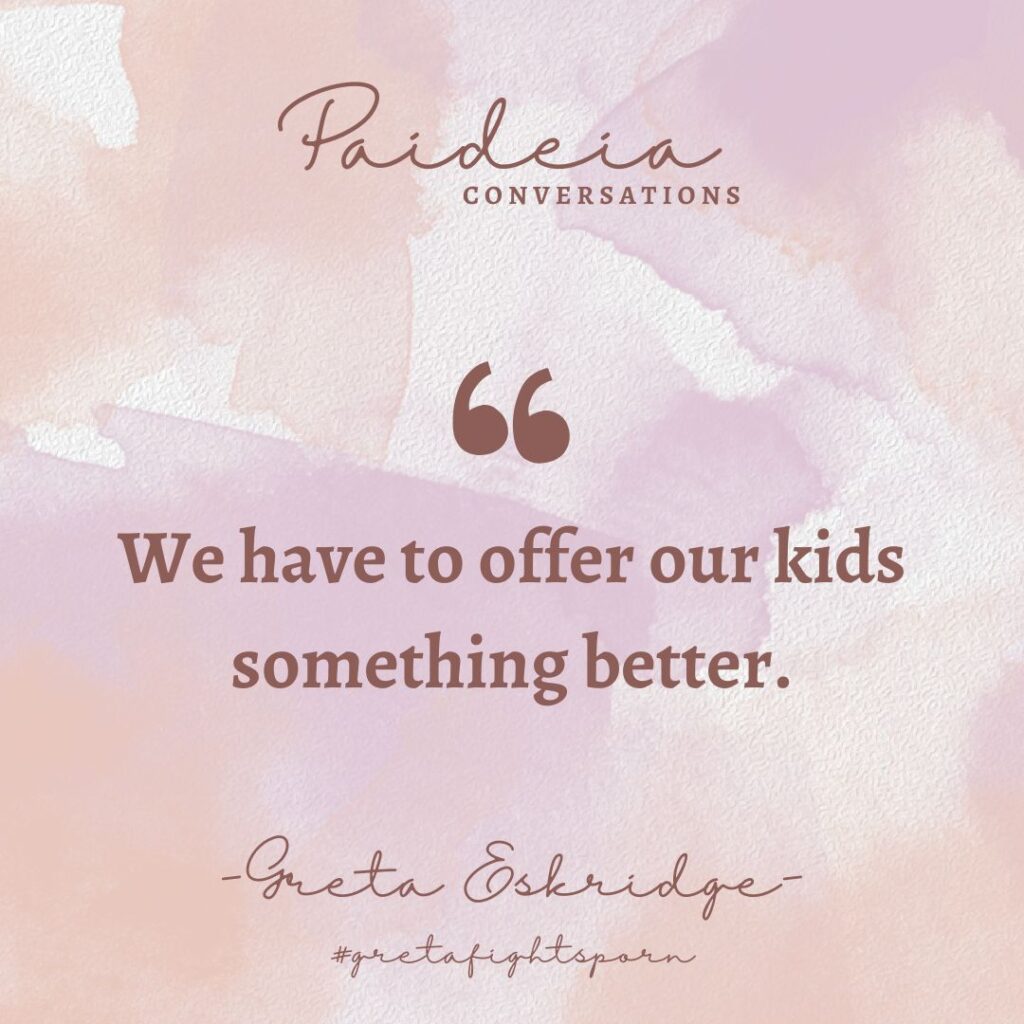
Melissa: do you think it’s important that the something better also has a dopamine hit?
Greta: it can, for sure. I mean, for example exercise. I mean, like, I know for myself when I’ve gone through periods where I’ve really struggled with like depression, like exercise provided those endorphins that made me feel good even when I didn’t feel good. Um, so that can definitely be something that might be good to pursue, you know. Like hey, if you’re feeling… especially if you know they’re in a place where you know they might be struggling, to be able to say go for a run right now, or you know, we put a climbing rope on our tree in our backyard. I have a son that’s like struggling with like anger or frustration, I’ll say, hey go climb that rope five times, you’ll feel better. But that’s not always gonna be available, you know. It’s really just more learning how to take those feelings, those negative emotions, and learning how to deal with them in a constructive, positive, and better way. But also just so that the lure, even if they’re not dealing with like wanting to look at porn, just to not, even if you’re not at that place, like preventatively fill their life and their days and their world with all the good things that are out there for them to do so it’s less of a temptation for them to go to at all.
Melissa: yeah. Something else that I love how you have phrased is, uh, not being afraid to be radical.
Greta: yeah.
Melissa: but that you equate radical with something like being Amish. [laughter] And so be more Amish than you think you need to be.
Geta: yes, and to give credit where it’s due, that’s from a book called Tech-Wise Family…
Melissa: oh, so that’s Andy Crouch.
Greta: yes. And he says in the beginning, he says, you don’t have to, you might not have to be all the way Amish, but you might want to be almost Amish. And that was like such a, that was just a really clear picture for me of what, what it looks like to be counter cultural really. And that’s what I think we do need to be counter cultural. I mean, the average age for kids to get their first smartphone is ten years old. I think we need to be counter cultural and we need to be radical and say, my ten year old does not need a smartphone. And thirteen year olds don’t need a slew of social media accounts. I think they don’t need any social media accounts at all, but I’m radical. [laughter] It’s a lot for a thirteen year old to manage, right! I mean there’s so much, and there’s so much negative content on there that they can easily get sucked into. So we do have to be radical, we do have to say, I know all of your friends have this or are doing this, but in our family we don’t think that it’s best, and so we’re going to do it differently. And um, I think if we’re willing to do that and we’re willing to walk that line, our kids will be better for it.
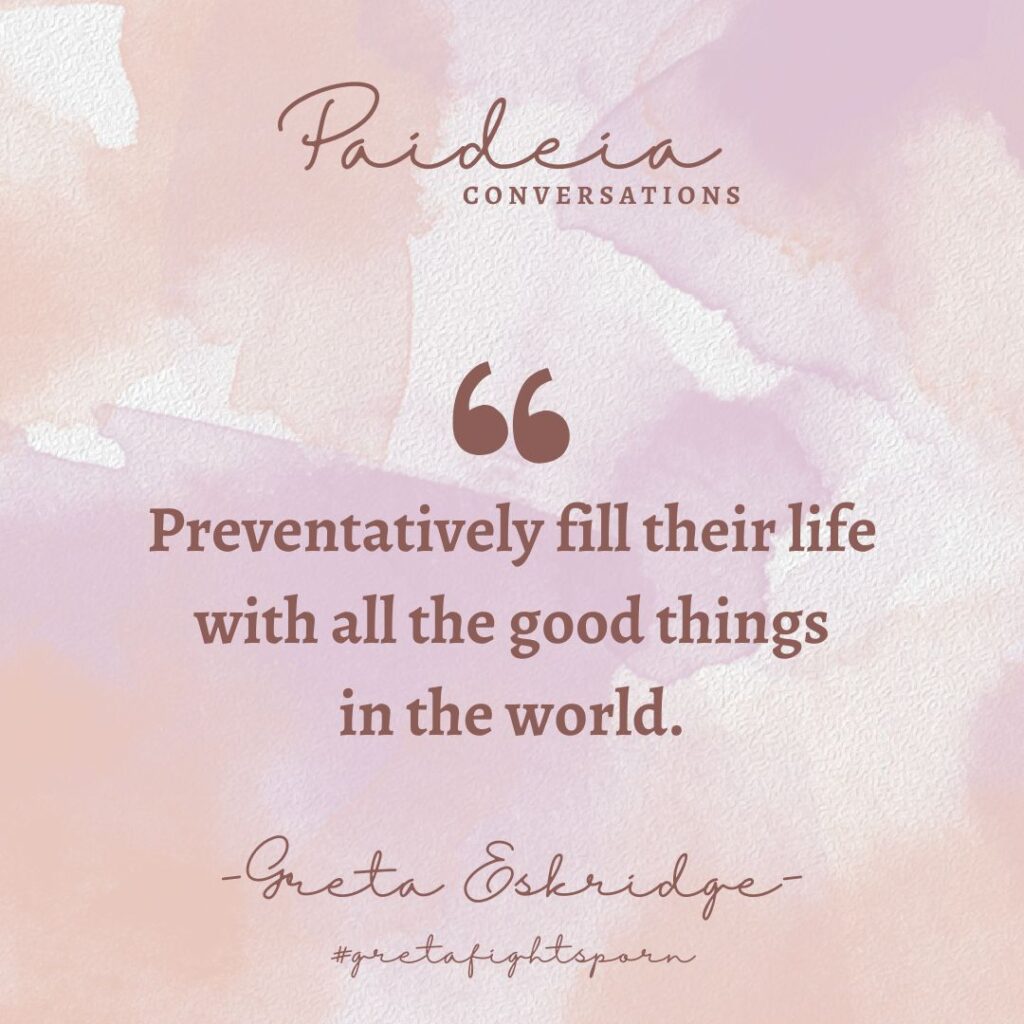
Melissa: I just read Habits of the Household by Justin Earley I think might be how you say his last name, and he used this quote from Frederick Douglas a lot, and then I know you’ve also used this quote that “it is easier to build strong children than to repair broken men.” And that’s not to say that it’s easy to raise strong children. Because it does take work, it does take prayer, it does take effort. And it can sometimes feel insurmountable but I think that idea of being unafraid to have those hard conversations or to make radical choices… that’s, it will still be more simple, and hopefully more loving to our children and more honoring to God, than to not do those things and have to deal with the repairing of the brokenness down the road.
Greta: yeah. Yeah, I agree.
Melissa: one other question. You have more sons than daughters, and that’s my… that’s my reality as well. So most of the time when I think about… especially pornography, but even just tech in general, my sons are more drawn to it than my daughter. She might grow into, you know, enjoying tech more but she’s not yet ten. The reminder that this subject and these conversations aren’t just for our sons, how do you… how do you approach that? Or do you approach it differently between your daughter and your sons?
Greta: I’m so glad you brought this up, because I always remind parents that pornography is not a male issue. It is not a female issue. It is a human issue. Because it impacts men, women, and children. And in the past, it was more common that men were engaging with pornography than women, but that is changing rapidly. Women, especially younger women are, and that includes teenagers, are engaging with pornography more than ever before. And so my daughter is not left out of the conversations. When we have conversations about the dangers of pornography, the damage pornography causes, um, it’s addressed to all my kids. I tend to divide the conversation by age appropriateness, not by sex. So my eleven year old is not having the same conversations… my eleven year old son is not having the same conversations that I’m having with the three teens who are, you know, eighteen, sixteen, and fourteen – two boys, one girl. So we’re just talking about it at an age appropriate level, not based on male or female. The place where we do have conversations that are separate would be more related to things that are, like, for example, when we’re gonna to talk about, you know, having a period. Well my boys are gonna know about that as well because I think it’s valuable and important for them to know um for, just for themselves just how the human body works for males and for females, for their future with their spouse. But then I’m gonna have a conversation with my daughter that’s gonna be different because she’s experiencing something that they won’t. But I understand her experience because I’ve had the same experience. So those conversations will be separate, but not entirely. And definitely when it comes to things like you know pornography or sexual predators or anything like that, those are for all of them because it impacts all of them.
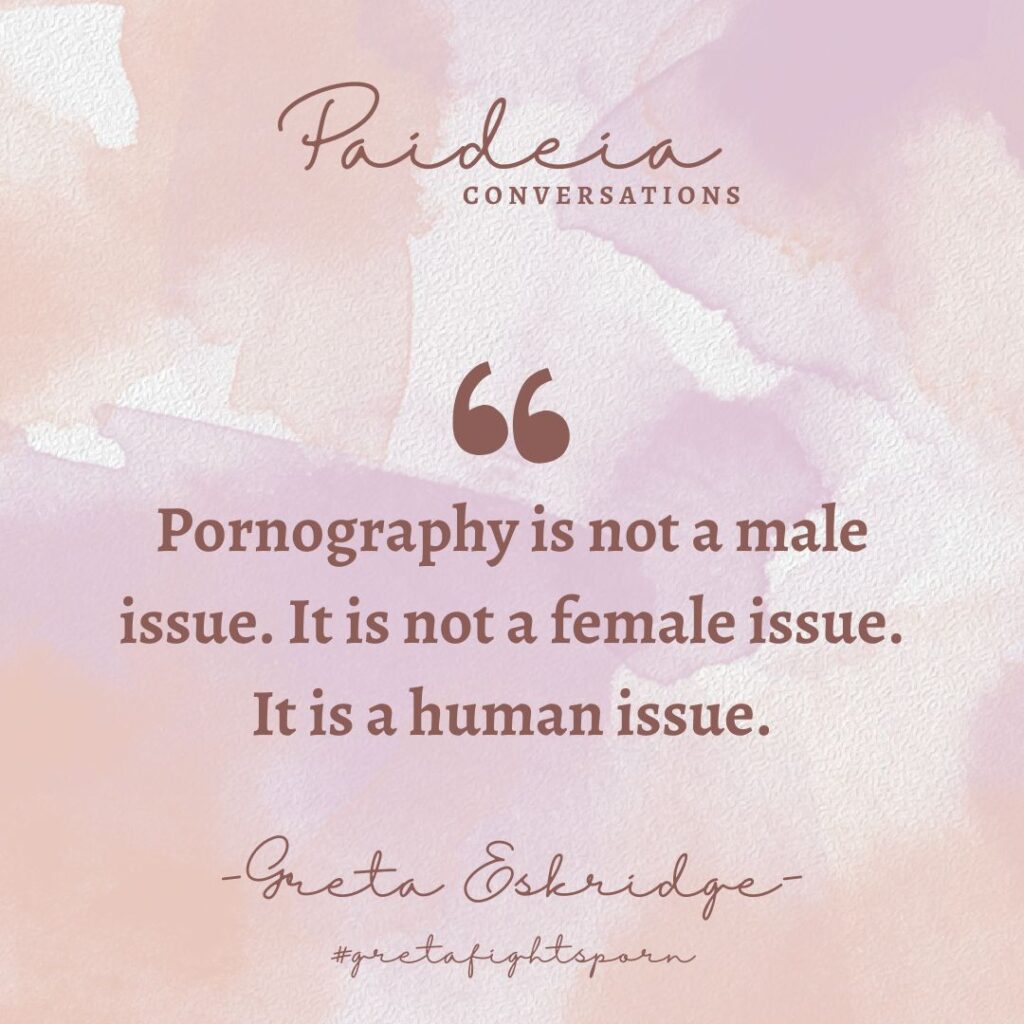
Melissa: it’s not a male issue or a female issue, it’s a human issue. I really like that. Yeah. Well, what’s sort of your, um, your last… [giggling] your last thing. I know I promised you we’d keep it short.
Greta: it’s hard to! There’s so much to say!
Melissa: I know! I just want this to be a teaser. Because I definitely want to, somehow, bring you into the conversation more fully. Even if not in person, you know, some kind of webinar or something, because I do think it’s an important issue. And if I’m feeling like I need to talk about it, then I think there’s other people in similar situations… and… but if you could just say one more thing, like what…
Greta: yeah, well I think, I would just echo what you just said that if you feel like you need to talk about it, then you know other people need to talk about it. And that starts in your own home with your own family. So not being afraid to broach the conversation with your kids first. But then also broaching it with your fellow moms, with other families. And to just, even if it’s… you don’t have to say, hey, I want to invite you over so we can talk about pornography. Like, they might be like, hey what’s wrong with you? [laughter] But more like, hey, I have this book that I just read with my kids and it was so helpful. Have you heard of it? Do you want to read it with your kids? Because I want to know that my kids and your kids are safe when they’re playing together. So talking about this difficult subject in a way that is proactive, and that you are willing to step into that awkwardness, because it’s going to be protecting not just your kids but the kids they’re playing with, and the kids in your neighborhood, the kids in your school, the kids in your church… that’s what we need to do. We need to be willing to just step over the awkwardness and say, all right, here’s a book I want to tell you about, or here’s an article, here’s a podcast I think you should listen to. Start the conversation. Not just with your family, but with everyone around.
Melissa: that’s just full circle right there. Like boom, high five! That goes right back to relationship and connection and communication. So, well done! [laughter]
Greta: thank you!
Melissa: well I just, I really appreciate you taking the time, today, amongst all the other things, and just having this little conversation with me. At the very least, I’m just grateful for your voice on this, your encouragement, and the hashtag because that’s something that I know I can click on and find some community on that. So.
Greta: yes, awesome. Well thanks for having me! It was a joy to talk to you even though we talk about awkward things. It can be done with even with some laughter, and we can do hard things, right?
Melissa: yes, we can by the grace of God! Amen!
Greta: amen. [laughter]
Melissa: aw, thank you, Greta. Okay. Well, we will talk again soon, one of these days.
Greta: we did it!
Melissa: and I just really appreciate you.
Greta: yeah, thanks for having me, it was good. That was a good conversation, really good. Awesome.
Melissa: okay, well, enjoy the rest of your day. Thank you so much
Greta: okay, you too, and I’ll talk to you soon, okay? All right. Have a good rest of the day. Bye-bye!
Melissa: and that brings today’s conversation to a close. You can find more conversations on paideia at PaideiaNorthwest.com and PaideiaSoutheast.com for more resources and practical encouragement. Join me again next time for another Paideia Conversation.
And in the meantime, peace be with you.
